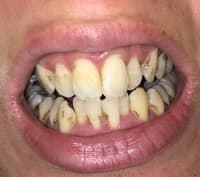Take-home bleaching can be used off-label in the treatment of these stains (as in this case report). Take home bleaching using 10% carbamide peroxide in custom-made bleaching trays is very safe and has low levels of teeth sensitivity associated with it, so it seems to be a very low-risk treatment for this condition. Whether you need repeat treatments is unknown.
Another method that can be considered is modification of the oral microbiome (which is also supposed to occur with take-home bleaching) using oral probiotics. The duration you need to use the probiotic to prevent recurrence is not known for certain.
These stains have been shown to occur in patients with good oral hygiene and at low risk for decay. There is an association with a higher salivary pH (which is protective against decay) and the iron content of drinking water.



